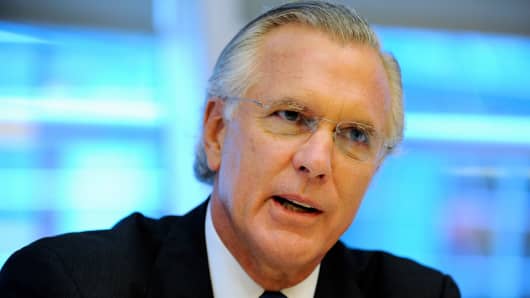The Federal Reserve has done its part to jumpstart the U.S. economy but a lack of action by Congress has prevented a recovery, Dallas Fed President Richard Fisher told CNBC.
Speaking just a few days after the central bank took the unprecedented step of declaring an open-ended quantitative easing initiative, Fisher said he objected to the program but understands why the Open Market Committee acted as it did.
Fisher is a nonvoting FOMC member who has been critical of previous QE programs.
"The efficacy of this program is where we disagree. There are costs and benefits. I argue more on the cost side, others argue on the benefits side," Fisher said on the "Squawk Box" program. "A decision was taken. But instead of hammering the Federal Reserve, point your fingers at Congress."
Specifically, Fisher said business owners are plagued with questions of "what are my taxes going to be, what kind of spending patterns are going to come out of the federal government, how do I deal with this explosion of regulatory morass that we have come out of Washington?"
With only FOMC member Jeffrey Lacker dissenting, the Fed said it would buy $40 billion per month of mortgage-backed securitiesin an effort to drive down interest rates on home loans. The stock marketreacted positively to the news Thursday and Friday but the momentum has not carried through this week.
Mortgage rates have fallen about a quarter percentage point since the announcement — "pretty much what I expected," Fisher said — but getting banks to lend money remains a problem.
He said he would have preferred the Fed to stand pat after expanding its balance sheet to $2.8 trillion.
"I think we're at stall speed. I think if we didn't do this we just keep ambling along," he said. "There are too many people out of work. We have a mandate. We're following that mandate given to us by the Congress of the United States."
The Fed actually has a dual mandate — to maintain both full employment and price stability.
But with the unemployment rateabove 8 percent for three and a half years and core inflation — not including food and energy prices — within the Fed's acceptable range, the central bank has chosen to target jobs now and worry about inflationlater.
Though he disagrees with the decision, Lacker said the Fed has filled its role and now needs Congress to do the same.
"The government has the ability to incent the private sector through tax and spending programs. Get on with it," he said. "We're providing the fuel. It is cheap and abundant. We've provided a lot. It happens to be my personal view we've provided too much."



